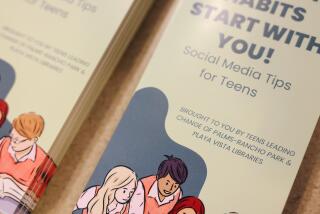Facebook ‘fasting’ drawing converts for Lenten season
- Share via
BALTIMORE — Late on the night before Ash Wednesday, Maura Toomb clicked into her profile on Facebook, her favorite social networking website. She took a deep breath and typed:
“I’m giving up Facebook for Lent. Seriously.”
Then the Loyola College junior signed off, ostensibly for 40 days and 40 nights.
“I’m going to use the extra time” -- dozens of hours a month, Toomb estimates -- “to reflect, to pray, and things like that.”
Facebook fasting is the penance of choice for some college students this Lenten season, which ends April 8, Easter Sunday. Others have sworn off MySpace, Instant Messenger and similar Internet outlets, all in the spirit of intensified religious devotion that precedes Easter.
In a world of technological pleasures, abstaining from Facebook is more spiritually meaningful than avoiding, say, soda or ice cream, the students argue -- and significantly harder.
“Facebook is a huge part of life, almost something that’s abused,” says Sam Hager, a freshman at the University of Minnesota who is boycotting Facebook until Easter. “I look at Lent as a time to resist temptation and a season to sacrifice.”
At least one Maryland campus ministry leader has championed the effort.
“I even talked about it in my homily at Mass,” says Father Rick Hilgartner, the chaplain at Mount St. Mary’s University in Emmitsburg. During Lent, he says, “there is this notion of giving up, and it isn’t just about chocolate or sweets or beer. I mentioned giving up Facebook and IM-ing as a way to free up time for other things.”
The Facebook fast is not as trivial as it sounds. The site, where friends track birthdays, post pictures, check homework, monitor romances and generally gossip, has become the connective tissue of undergraduate life, and ignoring it from Ash Wednesday through Holy Saturday is no small sacrifice. Some penitents are relying on willpower alone, but others have let roommates change their passwords so they can no longer access their own accounts. A few have deleted their profiles.
“The second day, I almost went on,” says Analiza Saraza, a 19-year-old international business major at Mount St. Mary’s. “It was like, ‘www.F-A-C.’ ” At the same time, she had to stop herself from checking Instant Messenger, which she also renounced this year.
So taxing are these Lenten undertakings that more than a dozen “giving up Facebook for Lent” support groups have sprung up on the site.
Their value is dubious, however, because the devout are theoretically not allowed to view them until April.
This year, Lent began Feb. 21. The time span -- 40 days and 40 nights, excluding Sundays -- is symbolic of a period Jesus Christ spent in the desert, being tempted by Satan. To commemorate his suffering, some Christians skip meat on Fridays and refuse other treats.
“You want to call to mind the events of Jesus’ death and life and what that all means,” says Sister Mary Roy Weiss, director of campus ministry at the College of Notre Dame of Maryland.
Luckily, “there are many different ways to be ascetic,” Weiss says -- especially, it seems, on a college campus. A highly unscientific survey of local students revealed penances as diverse as shunning makeup, “Grey’s Anatomy” and a certain bar.
Most undergraduates, though, reported giving up some kind of food: Caesar dressing, Peppermint Patties, more than one Coke per day, and cake, “except when it occurs in cupcake form.”
If this is done in the true spirit of sacrifice, religious officials say, then fine, but Lent should not double as a diet -- indeed, the fact that Lent often overlaps with spring break is awfully convenient for those believers who soon will be sporting bikinis.
That’s partially why some campus religious leaders like the idea of eschewing social technologies instead of snacks. Not only is going Facebook-free a legitimate hardship, but it leads to extra time for prayer, works of charity or old-fashioned communion with friends.
“You can sacrifice these things to free yourself, to do good, to spend time with a student in need,” Hilgartner says. “It’s not just about spiritual self-denial, but about making room for other things.”
As one anonymous Facebook faster posted on a support group: “God is not on Facebook. We hereby demonstrate that our souls are not enslaved to this vice.”
But proving as much is not always easy. Such social abstinence is new to most students, and some feel so isolated that they might as well be wandering in the desert, forgetting birthdays left and right. Often their less pious friends supply temptations, pretending that cute seniors have been posting flirtatiously, for example.
Thus some students have downgraded their pledge to visiting Facebook just once a day, checking only certain people’s profiles, or having their roommates peek for them.
And those who’ve quit cold turkey are steeled for the trials to come.
“I think it’s been like six days, but I can see it being quite difficult in the future,” says Tommy Laughlin, a Loyola material engineering major who erased his whole profile. “On day 32, 33, 34, I anticipate more spiritual suffering.”
This holy season hasn’t been easy for the technologically bereft.
But nearly two weeks into Lent, some are starting to see their sacrifice’s silver lining.
“I’ve been trying to do better things with my life,” says Molly McKeogh, a Loyola sophomore who last checked Facebook in the minutes before Mass on Ash Wednesday. “I’ve been going to bed earlier, and I’m not stalking people in my life who I should not be stalking.”
On the other hand, she adds, “I’m really excited for Easter.”






